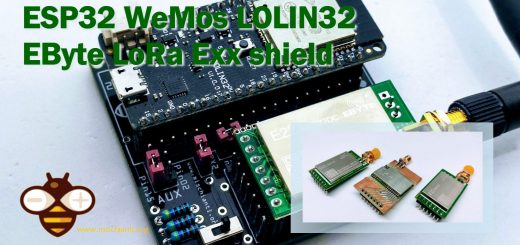Home › Forums › The libraries hosted on the site › EByte LoRa e22 UART devices sx1262/sx1268 › Data structure lost
- This topic has 3 replies, 1 voice, and was last updated 3 years, 11 months ago by
Renzo Mischianti.
-
AuthorPosts
-
-
5 February 2022 at 20:31 #18368
Javi
Hello, I am using four E22-900T22D, three as transmitters and one as receiver, each transmitter sends a data structure every 2 seconds:
struct Message { chartype[5] = "1"; byte amp1[5]; byte volt1[6]; } message; struct Message { chartype[5] = "2"; byte amp2[5]; byte volt2[6]; } message; struct Message { chartype[5] = "3"; byte amp3[5]; byte volt3[6]; } message;The receiver receives the data from the 3 senders well, but there are times that I lose messages.
I want to use the function, ResponseContainer rs = e32ttl.receiveMessageUntil(); to read each structure individually.
Can I use the function, ResponseContainer rs = e32ttl.receiveMessageUntil(); to receive a structure or only be used to receive a string?
Thank you.
-
5 February 2022 at 22:46 #18372
Hi Javi,
You can use the specified method, check the article of e32 module as reference
Ebyte LoRa E32 device for Arduino, esp32 or esp8266: power saving and sending structured data – Part 5receiveMessageUntil is only for string.
But attach your code, we try to check better.
Bye Renzo
-
6 February 2022 at 09:23 #18373
Javi
Thank you very much Renzo, I send you the code of the emitters ( 2 arduino nano) and receiver, in the emitters I use arduino nano and in the receiver a Mega:
Emitter 1 code (Nano):
#include "Arduino.h" #include "LoRa_E22.h" #include <SoftwareSerial.h> SoftwareSerial mySerial(4, 5); // Arduino RX <-- e22 TX, Arduino TX --> e22 RX LoRa_E22 e22ttl(&mySerial, 3, 7, 6); // AUX M0 M1 void setup() { Serial.begin(9600); delay(500); // Startup all pins and UART e22ttl.begin(); Serial.println("Hi, I'm going to send message!"); struct Message { char type[5] = "1"; byte amp1[5]; byte volt1[6]; } message; *(int*)(message.amp1)=100; *(int*)(message.volt1)=10; // Send message ResponseStatus rs = e22ttl.sendMessage(&message, sizeof(Message)); // Check If there is some problem of succesfully send Serial.println(rs.getResponseDescription()); } void loop() { delay(2000); struct Message { char type[5] = "1"; byte amp1[5]; byte volt1[6]; } message; if (*(int*)(message.amp1)>999){ *(int*)(message.amp1)=10; } (*(int*)(message.amp1))++; if (*(int*)(message.volt1)>99){ *(int*)(message.volt1)=10; } (*(int*)(message.volt1))++; // Send message ResponseStatus rs = e22ttl.sendMessage(&message, sizeof(Message)); // Check If there is some problem of succesfully send Serial.println(rs.getResponseDescription()); }//——————————————————————–
Emitter 2 code (Nano):
#include "Arduino.h" #include "LoRa_E22.h" #include <SoftwareSerial.h> SoftwareSerial mySerial(4, 5); // Arduino RX <-- e22 TX, Arduino TX --> e22 RX LoRa_E22 e22ttl(&mySerial, 3, 7, 6); // AUX M0 M1 void setup() { Serial.begin(9600); delay(500); // Startup all pins and UART e22ttl.begin(); Serial.println("Hi, I'm going to send message!"); struct Message { char type[5] = "2"; byte amp2[5]; byte volt2[6]; } message; *(int*)(message.amp2)=100; *(int*)(message.volt2)=10; // Send message ResponseStatus rs = e22ttl.sendMessage(&message, sizeof(Message)); // Check If there is some problem of succesfully send Serial.println(rs.getResponseDescription()); } void loop() { delay(1900); struct Message { char type[5] = "2"; byte amp2[5]; byte volt2[6]; } message; if (*(int*)(message.amp2)>999){ *(int*)(message.amp2)=10; } (*(int*)(message.amp2))++; if (*(int*)(message.volt2)>99){ *(int*)(message.volt2)=10; } (*(int*)(message.volt2))++; // Send message ResponseStatus rs = e22ttl.sendMessage(&message, sizeof(Message)); // Check If there is some problem of succesfully send Serial.println(rs.getResponseDescription()); } //-----------------------------------------------------------------------Receiver code (Mega):
#include "Arduino.h" #include "LoRa_E22.h" LoRa_E22 e22ttl(&Serial3, 3, 7, 6); // AUX M0 M1 void setup() { Serial.begin(9600); delay(1000); // Startup all pins and UART e22ttl.begin(); struct Message1 { byte amp1[5]; byte volt1[6]; }; struct Message2 { byte amp2[5]; byte volt2[6]; }; } //-------------------------------------------loop-------------------------------- void loop() { struct Message1 { byte amp1[5]; byte volt1[6]; }; struct Message2 { byte amp2[5]; byte volt2[6]; }; // If something available if (e22ttl.available()>1) { char type[5]; ResponseContainer rs = e22ttl.receiveInitialMessage(sizeof(type)); // Put string in a char array (not needed) // memcpy ( type, rs.data.c_str(), sizeof(type) ); String typeStr = rs.data; Serial.println(typeStr); if (typeStr == "1"){ ResponseStructContainer rsc = e22ttl.receiveMessage(sizeof(Message1)); struct Message1 message = *(Message1*) rsc.data; Serial.println(*(int*)(message.amp1)); Serial.println(*(int*)(message.volt1)); rsc.close(); }else if (typeStr == "2"){ ResponseStructContainer rsc = e22ttl.receiveMessage(sizeof(Message2)); struct Message2 message = *(Message2*) rsc.data; Serial.println(*(int*)(message.amp2)); Serial.println(*(int*)(message.volt2)); rsc.close(); }else{ Serial.println("Something goes wrong!!"); } } } -
6 February 2022 at 17:50 #18377
Hi Javi,
It seems all ok.
But change the size of int value to 2 byte.
And type to 1 charstruct Message { char type = '1'; byte amp1[2]; byte volt1[2]; } message;And reduce the packet size to 64bytes so It’s more responsive
configuration.OPTION.subPacketSetting = SPS_064_10;and enable the LBT to prevent network problem
configuration.TRANSMISSION_MODE.enableLBT = LBT_ENABLED;Bye Renzo
-
-
AuthorPosts
- You must be logged in to reply to this topic.





